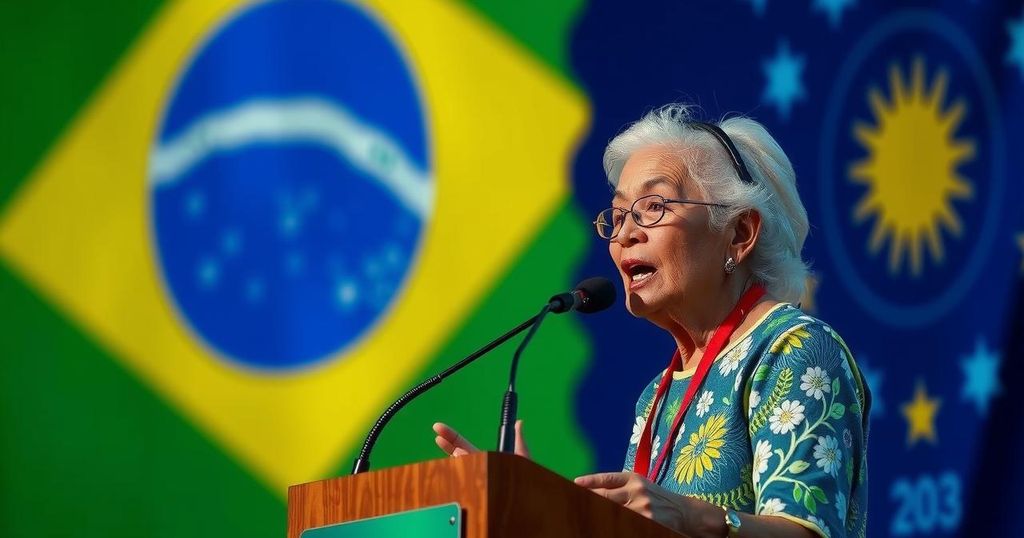Climate change
ASIA, AZERBAIJAN, BAKU, BELÉM, BELEM, BRAZIL, CHANGE COUNCIL, CLIMATE CHANGE, CLIMATE JUSTICE, ENVIRONMENTAL POLICY, FRANCIÉLI BARCELLOS, LU, LUIZ INÁCIO LULA DA SILVA, LULA, PARIS AGREEMENT, RIO DE JANEIRO, SOUTH AMERICA, SUSTAINABLE DEVELOPMENT, UN, UNESCO, UNITED, UNITED NATIONS
Fatima Khan
0 Comments
President Lula Calls for Urgent Climate Action at G20 Brasil Leaders’ Summit
President Lula emphasized the urgent need for climate action during the G20 Brasil Leaders’ Summit, stating that COP30 is our last chance to prevent irreversible climate damage. He urged developed nations to advance their climate goals and proposed a UN Climate Change Council. The Leaders’ Declaration affirmed commitments to sustainable development and recognized the critical role of indigenous peoples and funding disparities between nations.
During the G20 Brasil Leaders’ Summit, President Luiz Inácio Lula da Silva articulated a strong message regarding climate action, declaring that COP30 represents the final chance to avert an irreparable disruption in the climate system. Leading discussions in Rio de Janeiro, President Lula underscored the need for action from affluent nations and highlighted the integral role of indigenous communities in ecological preservation. In his remarks, he advocated for the establishment of a United Nations Climate Change Council to enhance the coordination of global efforts aimed at tackling climate issues. The President asserted the necessity for developed countries to intensify their climate neutrality commitments, proposing an acceleration of their targets to as early as 2040. His insistence on equitable responsibility reflected a broader commitment to climate justice, emphasizing that without acknowledging past responsibilities, wealthy nations lack the moral authority to drive governments in the Global South towards ambitious climate initiatives. Lula called upon all participants to ensure that COP30 becomes a pivotal moment for global climate governance. Additionally, the Brazilian government is set to unveil the Global Initiative for Climate Change Information Integrity, aimed at fostering international collaboration on climate action. The G20 Leaders’ Declaration underscored the urgency of global mobilization against climate change impacts, pledging commitments to reform international financial systems and promote an inclusive and sustainable energy transition that considers the realities faced by low-income populations. Significantly, the Declaration also acknowledged the vital contributions of indigenous peoples to forest conservation efforts and recognized the financial inequities that exist between developed and developing nations in their energy transition endeavors. The G20’s commitment to social inclusion, poverty alleviation, and equitable taxation for the ultra-wealthy were also central themes of the discussions, establishing a holistic approach to global challenges at this year’s summit.
The G20 Brasil Leaders’ Summit convened global leaders to discuss pressing challenges, notably climate change and sustainable development. President Lula’s leadership was crucial in emphasizing the particular responsibilities of developed nations in combating climate threats while fostering support for developing economies. This summit highlighted significant recognition of indigenous peoples’ roles in environmental stewardship and sought to address historical injustices in resource allocation. Amid growing climate concerns, the proposed UN Climate Change Council represents an essential evolution in global governance addressing climate issues.
In conclusion, the G20 Brasil Leaders’ Summit represented a critical juncture in international climate discourse, with President Lula calling for enhanced commitments from developed nations to expedite global climate goals. The robust initiatives discussed, including the establishment of a Climate Change Council and the urgency for immediate action encapsulated the spirit of cooperation needed to combat climate change effectively. The recognition of indigenous communities and the push for equitable financial practices marks a significant step towards inclusive and sustainable development.
Original Source: www.g20.org




Post Comment